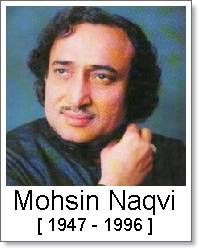
Mohsin Naqvi: The Renowned Urdu Poet
Mohsin Naqvi (pen name of Syed Ghulam Abbas Naqvi) was a celebrated Pakistani Urdu poet, renowned for his poignant ghazals that delve into themes of love, longing, loneliness, philosophical introspection, and the tragedy of Karbala. Born on May 10, 1947 (or May 5, per some sources), in the village of Sadat near Dera Ghazi Khan, Punjab, Pakistan, he came from a modest Syed family—his father, Syed Chirag Hussain Shah, was a saddlemaker and food vendor. Naqvi had six siblings and grew up in relative poverty, which deeply influenced his evocative writing. He adopted his pen name early in his literary journey and became a voice for human emotions, often described as giving “the deepness of an ocean” to feelings of yearning and sorrow.
Education and Early Influences:
Naqvi pursued his education with determination, graduating from Government College on Bosan Road in Multan. He later earned a Master’s degree in Urdu from the University of Punjab in Lahore. His poetic foundations were laid under the guidance of local poet Rafiq Khawar Jaskani in Dera Ghazi Khan, where he began crafting couplets and ghazals. By the time he arrived in Lahore, he was already known as Mohsin Naqvi, leaving behind his birth name for his artistic identity.
Literary Career and Style
Naqvi’s poetry is characterized by its psychological depth, emotional resonance, and accessibility, making it both introspective and universally appealing. He specialized in ghazals, excelling in genres like romantic love, social commentary, and religious devotion—particularly to Ahl al-Bayt (the family of Prophet Muhammad) and the martyrdom at Karbala, earning him the title “Poet of the Ahl al-Bayt.” His verses on Karbala are recited widely across Pakistan during religious gatherings, blending profound spirituality with raw human pain.
He also ventured into lyricism, writing songs for films like Bazaar-e-Husn, including the acclaimed track “Lahron Ki Tarah Tujhko Bikharne Nahi Denge,” which won him a national award for best film song and boosted his fame. One of his most iconic ghazals, Aawaargi, was immortalized by ghazal maestro Ghulam Ali, capturing themes of alienation and unfulfilled longing.
Naqvi briefly dabbled in politics, contesting elections for the Pakistan Peoples Party, but soon returned to poetry, viewing it as his true calling. His work critiques sectarian violence and societal divides, reflecting the turbulent 1980s and 1990s in Pakistan. Fans and critics alike praise his “fearless” voice and ability to pierce the heart with words that soothe yet unsettle.
Tragic End and Legacy
Naqvi’s life was cut short on January 15, 1996, when he was assassinated in Lahore’s Main Bazaar (near Moon Market) by gunmen who fired six bullets into his chest. As a prominent Shia Muslim poet who openly condemned sectarianism, his death is widely attributed to targeted violence amid rising extremism in Pakistan. Even in his final moments, he reportedly recited poetry to a student accompanying him. He was buried in his hometown of Dera Ghazi Khan.
Today, Naqvi’s legacy endures through his son’s poetry (Syed Aqeel Mohsin Naqvi, who also focuses on Ahl al-Bayt themes), online collections on Rekhta and UrduPoint, and social media pages dedicated to his work. His verses continue to inspire, recited in mushairas (poetry gatherings) and sung by artists, reminding readers of love’s fragility and faith’s endurance. As one admirer put it: “The first word that comes to mind when I hear Mohsin Naqvi’s name is ‘Fearless.’”
For a taste of his poetry, here’s a famous couplet from Aawaargi (transliterated and translated loosely):
Urdu:
Ab ke baarish mein ye kar-e-ziyaan hona hi tha
Apni kacchi bastiyon ko be-nishaan hona hi tha
English Translation:
In this rain, this act of destruction was inevitable
Our fragile homes were destined to vanish without a trace.
Published Works:
During his short life, Naqvi authored several collections of poetry, including:
• Mauj-e-Idraak (Waves of Realization)
• Tuloo-e-Ashk (Rise of Tears)
• •Haq Elia (Right of Elijah)
• Mataa-e-Dard (Treasure of Pain)
Mohsin Naqvi Poetry Collection
| Ghazal | Nazm |
| Wo shaaḳh-e mahtab kat chuki hai | |
| Firaaq subahon ki bujhti kirnen | |
| December mujhe raas aata nahin |